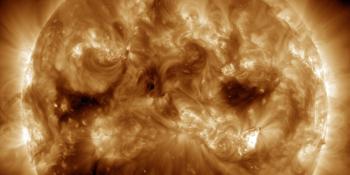Visualizzazione archivio di venerdì, 22 marzo AM
Rapporto attività solare
Ogni brillamento solare menzionato nel rapporto ha un fattore di scala, applicato dal Centro di Predizione Meteorologica Spaziale (SWPC). A causa del fattore di scala del SWPC, i brillamenti solari sono segnalati come ridotti del 42%, rispetto ai dati di qualità scientifica. Il fattore di scala è stato rimosso dai nostri dati archiviati sui brillamenti solari, per riflettere le unità fisiche reali.
Rapporto dell'Attività Geofisica Solare 2002 Mar 22 2200 UTCPreparati dal SWPC della NOAA© ed elaborati da SpaceWeatherLive.com
Rapporto Congiunto USAF/NOAA dell'Attività Solare e Geofisica
SDF Numero 081 Emesso alle 2200Z il Mar 22 2002IA. Analisi delle Regioni Solari Attive e Attività dalle 2100Z-21 alle 2100Z-22 Solar activity increased to moderate levels. Region
9866 (S10W96) produced a long-duration M1 X-ray flare at 22/1114 UTC
as it crossed the west limb. The flare was associated with a halo
CME and a proton event at greater than 10 MeV. Region 9866 was in a
slow decay phase during the last few days of its passage. Region
9878 (N08E54) produced a C8 X-ray flare at 22/0618 UTC. Minor growth
may have occurred in this region. Region 9871 (S20W47) retained
minor magnetic complexity near its leader spots, but was relatively
stable. New Regions 9881 (S05W08) and 9882 (N15E74) were numbered.
IB. Previsione dell'Attività Solare
Solar activity is expected to be low
to moderate. There is a fair chance for an isolated, low-level
M-class flare during the period.
IIA. Sommario dell'Attività Geofisica dalle 2100Z-21 alle 2100Z-22
Geomagnetic field activity was at quiet to unsettled levels. A
greater than 10 MeV proton event began at geo-synchronous orbit at
22/2020 UTC in the wake of today's long-duration M1 flare. The event
was in progress and slowly increasing at the close of the period
with a reading of 10.5 pfu at 22/2100 UTC.
IIB. Previsione dell'Attività Geofisica
Geomagnetic field activity is
expected to be at quiet to unsettled levels during most of the
period. However, there will be a chance for brief active levels on
25 March in response to today's CME. The greater than 10 MeV proton
event is expected to end early on 23 March.
III. Probabilità dell'Evento dalle Mar del 23 alle Mar del 25
| Classe M | 40% | 40% | 40% |
| Classe X | 05% | 05% | 05% |
| Protone | 99% | 01% | 01% |
| PCAF | green | ||
IV. Flusso di 10.7 cm di Penticton
Osservato 22 Mar 172 Previsto 23 Mar-25 Mar 170/165/165 Media di 90 Giorni 22 Mar 212
V. Indici Geomagnetici A
Osservato Afr/Ap 21 Mar 005/008 Stimato Afr/Ap 22 Mar 008/008 Previsto Afr/Ap 23 Mar-25 Mar 010/010-010/012-010/015
VI. Probabilità dell'Attività Geomagnetica dal 23 Mar al 25 Mar
| A. Latitudini Medie | |||
|---|---|---|---|
| Attivo | 25% | 25% | 25% |
| Tempesta minore | 10% | 10% | 10% |
| Tempesta maggiore-grave | 05% | 05% | 05% |
| B. Latitudini Alte | |||
|---|---|---|---|
| Attivo | 30% | 30% | 30% |
| Tempesta minore | 15% | 15% | 15% |
| Tempesta maggiore-grave | 05% | 05% | 05% |
Tutti gli orari in UTC
<< Vai alla pagina della panoramica giornaliera
Ultime notizie
Ultimi messaggi dal forum
Unspecified geomagnetic activity 2205AR4048 114New satellites - Proba-3, PUNCH, SWFO-L1, GOES-U/19 36Incoming & Unnumbered Active Regions 1659Filaments and prominences 750
Altri argomentiSupporta SpaceWeatherLive.com!
Molte persone vengono su SpaceWeatherLive per seguire l'attività del Sole o sapere se ci sia la possibilità di vedere l'aurora, ma a maggior traffico corrispondono costi maggiori. Considerate una donazione se vi piace SpaceWeatherLive così che possiamo mantenere online il sito web!

Notizie sul meteo spaziale
| Ultimo brillamento X | 2025/03/28 | X1.1 |
| Ultimo brillamento M | 2025/04/01 | M2.5 |
| Ultima tempesta geomagnetica | 2025/03/27 | Kp5 (G1) |
| Giorni senza macchie | |
|---|---|
| Ultimo giorno senza macchie | 2022/06/08 |
| Media mensile Numero di Macchie Solari | |
|---|---|
| marzo 2025 | 134.2 -20.4 |
| aprile 2025 | 143 +8.8 |
| Ultimi 30 giorni | 129.8 -16.3 |


